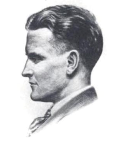The Great Gatsby by F. Scott Fitzgerald
Page 3 of 25 - 1 2 3 4 5 6 7 8 9 10 11 12 13 14 15 16 17 18 19 20 21 22 23 24 25 Purchase full notes for £6.95 (aprox $10.84)
Instead, all that Nick records is the following: ‘I saw Jordan Baker and talked over and around what had happened to us together, and what happened afterward to me’ (184 – italics added). This is a good example of what critics mean when they refer to Nick as an ‘unreliable narrator’ : he talks ‘over and around’ his story sometimes – and, in fact, the ambiguity of Nick’s sexuality is intimately bound up with the ambiguity of his narrative.
The mystery surrounding Nick’s orientation – and, by extension, the exact nature of his relationships with some of the central characters of the novel – provides an excellent example of Fitzgerald’s determination to generate ambiguity. To summarise this issue – admittedly in an overly bald and blunt fashion – there is a possibility that Nick Carraway could be straightforwardly heterosexual; he could equally, however, be exclusively homosexual; or he could be bisexual. All of these ‘readings’ are, in fact, perfectly possible without any significant suppressions or unconvincing readings of the text as published. On top of this, is the related ambiguity with regard to Nick’s awareness of his sexuality. His words to Jordan, ‘I’m five years too old to lie to myself and call it honour’ (185), could be taken to imply that he is aware of his sexual leanings (if the reader takes the view that he has, at the least, some homosexual inclinations) but that statement could obviously be interpreted in many different ways. The only ‘reading’, in fact, that makes complete and full sense in this respect is that the author fully intended to be ambiguous on the subject of Nick’s sexual preferences – as on so many other major questions in the novel.
What sense does it make to have a narrator who is both ‘honest’ and yet ‘dishonest’? Or why choose to have a narrator who may be either concealing or internally suppressing his own sexual leanings? Such fictional devices, in fact, make a great deal of sense. Nick genuinely believes himself to be honest. He tries hard to be honest with the reader and with the other characters who surround him, but sometimes he unquestionably fails – and those failures are often intimately bound up with his own evident confusion and dissatisfaction with regard to matters of the heart. The whole central issue, therefore, of how to assess the enigmatic phenomenon of Gatsby himself is anchored in the shifting sands of a narrator who is both honest and dishonest. But what other kind of ‘narrator’ finally is there? All human beings, after all, are inherently ‘unreliable’ when it comes to matters which concern them deeply. To give an extreme example, could anyone ever expect Jane Eyre to be ‘reliable’ on the subject of Rochester? Of course not! Nick inevitably presents his own idea of Gatsby – an idea full of contradictions and suppressions and imaginative reconstructions – and the reader needs to be continually aware of the ambiguous filter of his consciousness, before the ‘actual’ ambiguities of Gatsby’s character can even be properly addressed.
The mystery surrounding Nick’s orientation – and, by extension, the exact nature of his relationships with some of the central characters of the novel – provides an excellent example of Fitzgerald’s determination to generate ambiguity. To summarise this issue – admittedly in an overly bald and blunt fashion – there is a possibility that Nick Carraway could be straightforwardly heterosexual; he could equally, however, be exclusively homosexual; or he could be bisexual. All of these ‘readings’ are, in fact, perfectly possible without any significant suppressions or unconvincing readings of the text as published. On top of this, is the related ambiguity with regard to Nick’s awareness of his sexuality. His words to Jordan, ‘I’m five years too old to lie to myself and call it honour’ (185), could be taken to imply that he is aware of his sexual leanings (if the reader takes the view that he has, at the least, some homosexual inclinations) but that statement could obviously be interpreted in many different ways. The only ‘reading’, in fact, that makes complete and full sense in this respect is that the author fully intended to be ambiguous on the subject of Nick’s sexual preferences – as on so many other major questions in the novel.
What sense does it make to have a narrator who is both ‘honest’ and yet ‘dishonest’? Or why choose to have a narrator who may be either concealing or internally suppressing his own sexual leanings? Such fictional devices, in fact, make a great deal of sense. Nick genuinely believes himself to be honest. He tries hard to be honest with the reader and with the other characters who surround him, but sometimes he unquestionably fails – and those failures are often intimately bound up with his own evident confusion and dissatisfaction with regard to matters of the heart. The whole central issue, therefore, of how to assess the enigmatic phenomenon of Gatsby himself is anchored in the shifting sands of a narrator who is both honest and dishonest. But what other kind of ‘narrator’ finally is there? All human beings, after all, are inherently ‘unreliable’ when it comes to matters which concern them deeply. To give an extreme example, could anyone ever expect Jane Eyre to be ‘reliable’ on the subject of Rochester? Of course not! Nick inevitably presents his own idea of Gatsby – an idea full of contradictions and suppressions and imaginative reconstructions – and the reader needs to be continually aware of the ambiguous filter of his consciousness, before the ‘actual’ ambiguities of Gatsby’s character can even be properly addressed.

